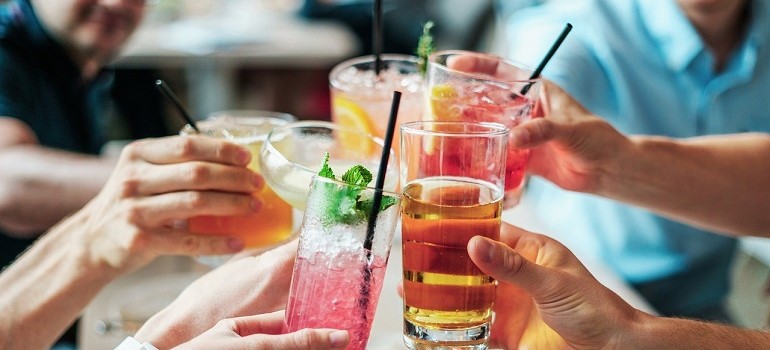How the Normalization of Drug Use in Society Can Lead to Addiction
Get Help Now
In the last twenty years, the normalization of drug use has become increasingly prevalent, raising concerns about its potential consequences. The perception that drug use is a harmless and socially acceptable behavior has permeated various aspects of our culture. Excessive substance use is present in media portrayals as well as social circles. However, beneath the surface lies a grave issue: the link between the normalization of drug use and addiction.
In this article, we will embark on an exploration of this phenomenon, shedding light on the factors driving drug normalization. We will look at the severe implications it can have on individuals and society. A large part of combating the rampant opioid epidemic is spreading awareness regarding the dangers of drug and alcohol use. Therefore, much of what we do at our treatment center in Lantana FL is offering support to individuals struggling with addiction. Besides offering treatment, we also provide patients with long-term support and many useful resources for maintaining sobriety. However, we also strive to raise awareness and provide valuable insights for into the risks and dangers of drug use. Join us, as we explore how the normalization of drug use in society can lead to addiction.
The Power of Perception: Influence of Media and Pop Culture
Hollywood wields an undeniable influence over our perceptions of drug use, leaving an indelible mark on popular culture. From blockbuster movies to chart-topping songs, the silver screen often presents drug use as cool and exhilarating. Movies and TV shows enchant us with the seemingly glamorous lifestyles of our beloved movie stars. However, beneath the veneer of glitz and glamour lies a perilous reality. Television and movies consistently downplay the devastating effects of drug use, trivializing the profound harm it inflicts. These portrayals conveniently omit the aftermath of substance use. To our detriment, they shield us from witnessing the full extent of the damage and the insidiousness of addictive patterns.
Through repeated exposure, we unwittingly become desensitized to the mainstream depiction of drug and alcohol use. These portrayals subtly infiltrate our consciousness, operating beyond our conscious awareness or consent. Television and movie characters casually pour themselves a drink as a coping mechanism when overwhelmed or anxious. They turn to their drug of choice to counteract panic attacks or bolster their confidence in the face of challenges. When confronted with daunting situations, they take a shot to steel themselves and navigate through adversity. In overwhelming stress, their drug of choice becomes a crutch, falsely promising strength and enhanced resilience. However, in real-life situations, that behavior would quickly lead to dependence and addiction. Many individuals who enter our alcohol detox Florida programs started using alcohol as a coping mechanism. Thankfully, in rehab, we can help treat their addiction and teach them productive coping skills that don’t involve substance use.

Social Acceptance and Peer Pressure
The dangers of peer pressure in relation to substance use are pronounced among both youth and adults. Peer pressure refers to the influence one’s social circle exerts to engage in certain behaviors, including drug use. When drug use becomes normalized in society, it creates an environment where succumbing to peer pressure becomes increasingly challenging. The desire to fit in, be accepted, or avoid being labeled as “uncool” can lead individuals to make dangerous choices. With the overall normalization of drug use in society these choices often involve excessive consumption of dangerous substances.
The pressure to conform to social norms can be especially potent during adolescence. This is a period marked by heightened vulnerability to external influences. Young adults may start their journey with alcoholism by partying and indulging in gummy shots. The normalization of drug use in society further compounds the risks, blurring the lines between acceptable and harmful behavior. As a result, people may find themselves spiraling into addiction. They are propelled by the belief that substance use is an ordinary part of life, rather than a destructive path. Even adults aren’t immune to these pressures and frequently get pushed into uncomfortable situations regarding drug and alcohol use.
Unfortunately, many drugs are extremely potent and can lead to addiction after even a single use. To make matters worse, some of the most popular party drugs, such as heroin and cocaine, can leave lasting damage. In order to deal with addiction to these drugs, Floridians struggling with substance abuse must first undergo drug detox Florida. Detox is the first step in treating addiction since it helps the body get rid of toxins. Only then can the true healing process begin.

Normalizing Prescription Drug Use
The normalization of prescription drug use has played a significant role in fueling the devastating global opioid epidemic. There seems to be a perception that prescription drugs are safer than illicit substances. This has led many individuals to believe that using prescription medications for non-medical purposes is relatively harmless.
This normalization is perpetuated by various factors, most notably misleading marketing strategies by pharmaceutical companies. There is also a lack of comprehensive education about the risks and potential for addiction associated with these medications. As a result, a significant number of people have unknowingly fallen into the trap of opioid addiction. Some of these individuals developed an addiction through misusing their own prescriptions or obtaining these drugs through illicit means. The normalization of prescription drug use has contributed to the rapid proliferation of opioid dependency.
Consequently, we’ve seen the already grave effects of the opioid epidemic gain momentum and spread quickly through various communities. The epidemic underscores the critical need for increased awareness, education, and comprehensive measures to address this crisis. If you or a loved one are affected, reach out to our opioid detox center Florida. We can discuss treatment options and offer you a path to recovery. Drugs don’t have to consume your entire life, with determination and some professional help, you can lead a substance-free life.
The Role of Legalization and Decriminalization on the Normalization of Drug Use
Legalization and decriminalization of certain drugs have been hotly debated topics in recent years. While these policies aim to address drug-related issues, they can inadvertently contribute to the normalization of drug use. When substances once deemed illegal become widely available and socially acceptable, the lines between responsible use and addiction can blur. Even legal substances can present risks and dangers if they are misused or excessively consumed. It’s crucial to examine the potential risks and benefits of these policies, ensuring we consider the long-term impact on society.

Cultural and Historical Factors that Lead to the Normalization of Drug Use
Cultural factors significantly influence drug use, shaping attitudes and behaviors surrounding substances such as drugs and alcohol. These substances have been deeply ingrained in various cultures throughout history, playing significant roles in religious, social, or medicinal practices. Traditional rituals and ceremonies, for instance, may involve the consumption of mind-altering substances. These cultural contexts may not necessarily lead to addiction in their historical context. However, they lay the foundation for the normalization of drug use within a particular society.
Fast forward to the modern era, and the availability and accessibility of drugs and alcohol have increased exponentially. Cultural legacies intertwined with drugs and alcohol and contemporary factors like peer pressure, media influence, and social acceptance create an environment where substance use can easily tip into addiction. These substances’ historical and cultural significance has shaped perceptions, normalizing their use and rendering it more challenging to recognize and address the potential dangers of addiction in our present-day society.

How Social Media Promotes Drug and Alcohol Use
Social media has emerged as a powerful influencer in our lives, and its impact on drug use shouldn’t be underestimated. With the widespread use of social media, individuals, particularly impressionable youths, are exposed to content that promotes dangerous lifestyle choices. Apps and platforms often glamorize drug use, portraying it as exciting, cool, or even as a means of fitting in. This exposure can have significant consequences. Studies have shown that teenagers who actively engage with social media are at a higher risk of substance abuse. Social media and digital communication make teens more likely to consume cigarettes, alcohol, and drugs.
The constant bombardment of images and messages normalizing substance use can desensitize teenagers and distort their perception of these behaviors. Moreover, social media provides a platform for peer pressure to thrive. Many teenagers may feel compelled to experiment with substances to gain acceptance or validation from their online peers. The combination of the persuasive power of social media and the vulnerability of teenagers can create a toxic environment. The pressures of presenting oneself as successful and popular on social media contribute to an increased risk of substance abuse. Recognizing the influence of social media on impressionable youths is essential to protecting their well-being.
If you suspect a loved one has turned to drugs, contact our medical detox Florida treatment center. Our admissions coordinators will explain how our treatment programs function, they can answer any questions you may have. Attempting withdrawal alone can be dangerous. Due to the, sometimes extreme, withdrawal symptoms individuals turn to drug use and restart the cycle of addiction. However, you should also be careful when approaching a loved one regarding their addiction. Teenagers tend to be secretive, and a strong approach may only push them further into isolation and substance use.
Consequences of the Normalizing of Drug Use
The normalization of drug use doesn’t come without its share of consequences. When drug use becomes a normalized part of society, the risk of addiction skyrockets. We see individuals falling into the clutches of substance abuse disorders, tearing families apart and devastating communities. Moreover, a normalized drug culture’s economic and social implications are far-reaching, affecting productivity, healthcare systems, and public safety.
A troubling trend we can notice is that, alongside the normalization of drug use in society, we can see an increase in drug use as a means to achieve goals. The pressures of modern society leave many individuals turning to drugs as performance enhancers in their personal and professional lives. In an attempt to meet work deadlines or to excel in social situations, drug use is becoming viewed as acceptable. Alcohol is viewed as a social lubricant and is present at most parties and even family gatherings. Unfortunately, this normalization can have far-reaching consequences and can lead to addiction and a widespread opioid epidemic. Dealing with these issues requires a multifaceted approach to assess not only drug use, but also personal and professional expectations.

Raising Awareness and Shifting Societal Norms
We can’t afford to turn a blind eye to the normalization of drug use. Education and awareness programs play a pivotal role in combating this issue. Many individuals get involved in drug use being unaware of the risks that entails. Also, addiction usually has an impact on entire families or communities. These factors mean that our efforts must be broad enough to raise public awareness at a community level. Educate yourself and be aware of the signs of high-functioning addiction which is becoming commonplace.
By equipping individuals with accurate information about consequences of drug use, we can empower them to make informed choices. It’s crucial to create environments that promote healthier alternatives and supportive communities. Only in this situation can individuals feel valued and supported in their decisions to lead drug-free lives.
In Conclusion
The normalization of drug use in society is a pervasive issue with far-reaching implications. From the influence of media and pop culture to the power of peer pressure, multiple factors contribute to this phenomenon. However, by raising awareness, challenging societal norms, and promoting education, we can combat the normalization of drug use.
Unfortunately, as the normalization of drug use in society continues, we can expect to see a rise in addiction rates. It feels like we are already losing the war on drugs. Thankfully, there is still much that we can do, both as individuals and as a community. Pay attention to your loved ones, and look for signs of addiction in friends and family members. If you notice they have a substance use disorder, urge them to seek treatment. On the other hand, if you are struggling with addiction, know that you are not alone. Contact us, and we can provide you with the resources you need to overcome your addiction. A sober life is possible, reach out to us and take your first steps to a brighter future.